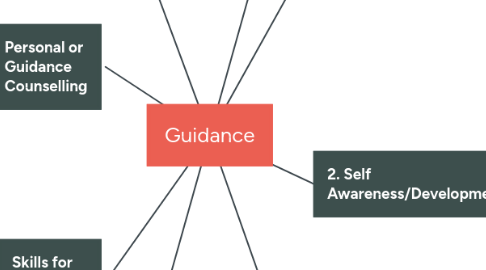
1. Client/Student
1.1. Reason for meeting
1.1.1. Personal Backgound
1.1.1.1. Social & Economic Factors
1.1.1.2. Family/Lack of Family
2. 2. Self Awareness/Development
2.1. Skills set
2.2. Interests
2.3. Achievements
2.3.1. Adler: Perception of oneself
2.3.1.1. Super: Career Development Model
2.3.1.1.1. Exploration Stage
2.4. Barriers
2.5. Preparation & Feedback
3. 1. Relationship Building
3.1. Physical Space
3.1.1. Calm & Welcoming
3.1.2. No Disruptions
3.2. Structure
3.2.1. Boundaries
3.2.2. Contract
3.2.3. Professional Manner
3.2.4. Respect
3.2.5. Soler Skills
4. Approach
4.1. Karl Rogers: Person Centred
4.1.1. Empathy
4.1.2. Congrence
4.1.3. Unconditional Positive Regard
4.2. Karl Glasser: Choice Theory
4.2.1. 5 Basic Needs
4.2.1.1. Love
4.2.1.2. Power
4.2.1.3. Fun
4.2.1.4. Freedom
4.2.1.5. Survival
5. 3. Planning for Student
5.1. 1. College Options
5.1.1. PLC
5.1.1.1. UCAS
5.1.1.1.1. Eunicas
5.2. 2.Confidence in Decision Making
5.3. 3. Identity Development
5.4. 4. Holland Codes
5.4.1. Work Personality
5.4.1.1. Fit to Job
5.4.1.1.1. Match/ No Match
5.5. 5. Other Options
5.5.1. Defer College
5.5.1.1. Get a Job
6. Personal or Guidance Counselling
6.1. Which is needed
6.2. Circumstances can change
6.3. Personal & Guidance in some sessions
7. 4. Review & Plan for future Sessions.
7.1. Review how sessions were for Student
7.1.1. Independent Research:Student
7.2. Achievements
7.2.1. Work in progress
7.2.1.1. Future Sessions Needed
8. Skills for Guidance Counsellor
8.1. Active listening
8.2. Paraphrasing
8.3. Observation skills
8.4. Effective questioning and probing skills
8.5. Soler
8.6. Self Review
8.6.1. Changes to make
8.6.2. Supervision

